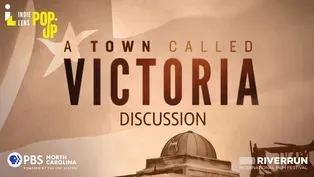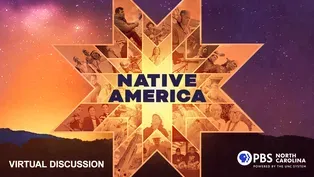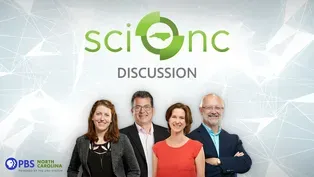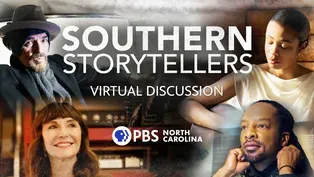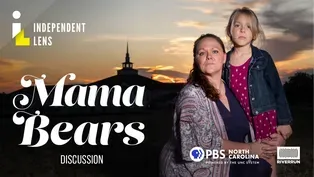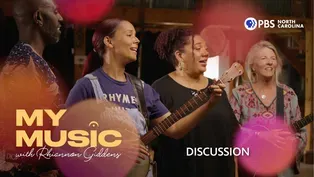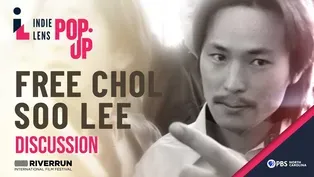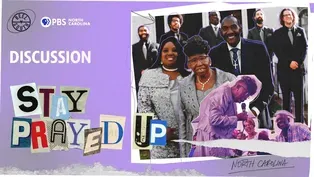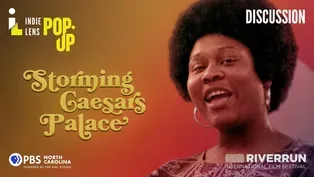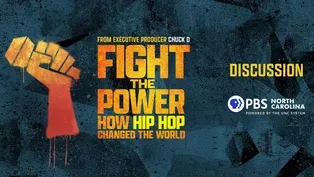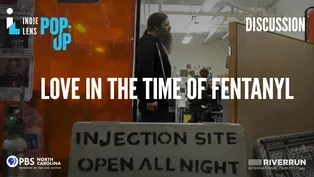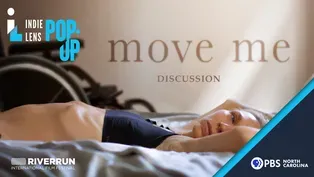PBS North Carolina Specials
Discussion | Becoming Frederick Douglass
10/3/2022 | 43m 43sVideo has Closed Captions
Scholars, professors and historians discuss the life and legacy of Frederick Douglass.
Deborah Holt Noel, senior producer and host of PBS North Carolina's Black Issues Forum, leads a conversation about the life and legacy of Frederick Douglass with professors and scholars. Our Panelists: Dr. Nick Bromwell, UMass; Dr. Samantha Davis, Oberlin College; Dr. Robert S. Levine, University of Marland; Dr. Mark Anthony Neal, Duke University & Dr. Jasmine Syedullah, Vassar College.
PBS North Carolina Specials
Discussion | Becoming Frederick Douglass
10/3/2022 | 43m 43sVideo has Closed Captions
Deborah Holt Noel, senior producer and host of PBS North Carolina's Black Issues Forum, leads a conversation about the life and legacy of Frederick Douglass with professors and scholars. Our Panelists: Dr. Nick Bromwell, UMass; Dr. Samantha Davis, Oberlin College; Dr. Robert S. Levine, University of Marland; Dr. Mark Anthony Neal, Duke University & Dr. Jasmine Syedullah, Vassar College.
How to Watch PBS North Carolina Specials
PBS North Carolina Specials is available to stream on pbs.org and the free PBS App, available on iPhone, Apple TV, Android TV, Android smartphones, Amazon Fire TV, Amazon Fire Tablet, Roku, Samsung Smart TV, and Vizio.
Providing Support for PBS.org
Learn Moreabout PBS online sponsorshipMore from This Collection
Discussion - A Town Called Victoria - Independent Lens
Video has Closed Captions
The filmmaker and former Victoria residents share their story. (46m 51s)
Discussion - Native America Season 2
Video has Closed Captions
Panelists discuss preserving the languages of Native American tribes. (39m 1s)
Video has Closed Captions
Sci NC executive producer and host, Frank Graff, chats about upcoming Season 6 of Sci NC. (26m 6s)
Discussion - Southern Storytellers
Video has Closed Captions
Author David Joy and others discuss storytelling and their new PBS series. (42m 13s)
Discussion - Mama Bears | Independent Lens
Video has Closed Captions
Producer and director Daresha Kyi discusses the film and LGBTQIA+ advocacy. (34m 41s)
Discussion - My Music with Rhiannon Giddens
Video has Closed Captions
Discussing the series with producers Will & Deni McIntyre and country artist Rissi Palmer. (39m 56s)
Discussion - Free Chol Soo Lee | Independent Lens
Video has Closed Captions
Local lawyers, professors and nonprofit leaders discuss wrongful convictions and reentry. (40m 44s)
Discussion - Stay Prayed Up, Reel South
Video has Closed Captions
The filmmakers discuss their journey with Mother Perry and The Branchettes. (45m 4s)
Discussion - Storming Caesars Palace | Independent Lens
Video has Closed Captions
Local professors and nonprofit leaders discuss welfare and the social safety net. (33m 2s)
Discussion - Fight the Power: How Hip Hop Changed the World
Video has Closed Captions
Local experts discuss the history of hip hop with PBS North Carolina. (59m 43s)
Discussion - Love in the Time of Fentanyl | Independent Lens
Video has Closed Captions
Local harm reductionists, therapists and others discuss the opioid crisis and more. (55m 44s)
Discussion | Independent Lens: Move Me
Video has Closed Captions
A dancer with blindness and disability advocates discuss adaptable arts programs. (38m 46s)
Providing Support for PBS.org
Learn Moreabout PBS online sponsorship- Good evening everyone and welcome.
My name is Deborah Holt Noel.
I am a senior producer and host here at PBS North Carolina.
We are so glad that you decided to join us.
A lot of you may know me from the "North Carolina Weekend Show".
I also produce the weekly "Black Issues Forum" program, a great voice for black communities in our state, and I'm very proud to produce both of them and very excited to bring you this conversation tonight.
We just watched the new documentary, "Becoming Frederick Douglass".
Douglas, an orator, abolitionist and statesman.
And many of us know him, but how much do we really know about his story and how it connects to us today?
So it's a very powerful story, and that's really what PBS North Carolina strives to do every day, is convey those powerful stories and cause us to be curious and ask questions and dig a little deeper.
It's exactly what this documentary does for us.
And so that's what we're going to do today.
We are here tonight to provide a safe space to learn, share thoughts, and have a meaningful conversation.
So please show respect and patience for others and their perspectives and different points of view.
And with that, we have an incredible panel this evening.
I'd like to introduce them.
We have Dr. Nick Bromell, Professor Emeritus of the University of Massachusetts at Amherst, and he's an author.
He is also featured in the documentary.
We have Dr. Samantha Davis, an Assistant Professor at Oberlin College, Dr. Robert S. Levine, a Distinguished Professor at the University of Maryland, and an author and he offered consult on this film.
And we have our own Dr. Mark Anthony Neal, a Professor at Duke University, and Dr. Jasmine Syedullah, Assistant Professor at Vasa College.
Welcome to all of you.
There's so much that we can talk about, so let's get to it.
I wanna open up with you, Dr. Syedullah.
Can you just share, you know, we learned a little bit about how hard Frederick Douglass fought for the right to education and to educate himself.
What do you think the role of reading and education played in the becoming of Frederick Douglass?
- I love this question.
I really appreciate the bits of detail about how he had to navigate his own barriers to access with cookies, with biscuits and the bartering that was necessary in order to access these, you know, rich histories and technologies of self-expression and communication.
The history of our being able to tell our own stories as black people and keep our own account of what counts has really been part of a larger democratic process, really the democratization of the country.
And we might take it for granted now, as the three texts of his autobiography have been canonized in our minds, but it wasn't the case that everybody could tell their stories.
In fact, he has a quote I'll share really quickly with you where he talks about in the "Life and Times", the 1888 narrative.
He talks about a fellow enslaved person who was snatched away forever for telling the truth about his experience with his master.
And this was the penalty he says, "for telling the simple truth "and answer to a series of plain questions.
"It was partly in consequences of such facts that slaves "when inquired as to their condition "or the character of their masters "would almost invariably say that they were contented.
"And their master's kind.
"Slave holders were known to have sent spies "among the slaves to ascertain if possible their views "and feelings in regard to their condition.
"Hence the maxim established among them "that a still tongue makes a wise head".
So what we learn from even his retelling of this simple story are the consequences of telling our own stories under these conditions.
And so beginning to become literate and learn to tell his own story, he really starts to break a historical silence that could have allowed us to remain part of the human story through our silence.
He, in fact says, "they would suppress the truth "rather than take the consequences of telling it.
"And in so doing, "they prove themselves part of the human family".
And he did the opposite, right?
He used his story to become part of a human family that was becoming, right?
And so his becoming is our collective becoming.
And I am really enchanted and enriched by this retelling of his story, thank you so much.
- Thank you, because as you speak, I think about the importance of telling our truth, telling the truth, and how that has remained a challenge to this day.
- That's correct.
- I wanna bring you in, Dr. Bob Levine.
So interesting also that the film talks about how important it was for Douglass to overcome the slave master Covey, who was a slave breaker.
And not only that he had to overcome him early in his life, but that he needed to overcome him, not by way of physical overcoming, but also intellectually.
Can you talk a little bit about the importance of overcoming him and also Covey's important goal to not kill Frederick Douglass and just that battle?
- Yeah, I mean, that's a key battle.
It's at the center of the narrative and then Douglass tells it over and over, sometimes in different ways.
So I think that that's important to emphasize.
But in the 1845 narrative, Douglass is still working with William Lloyd Garrison, who was against the use of violence.
And so Douglass played down the violence.
He presents himself as rising up against the slave breaker and wrestling with him.
And if you look at it closely, he actually does say that he kicks him.
I mean, it's not like it just a love match.
Douglass describes this as taking two hours and that they basically wrestled to a draw.
And he says that "this is one of the several ways, "several moments where I realized "that I would not be enslaved and that I could become free".
That's in 1845.
In 1855 in "My Bondage and My Freedom", and Dr. Bromell on our panel recently did a new addition of "My Bondage and My Freedom", Douglass presents this fight or resistance to Covey a bit more violently and also as not just a moment of individual glory.
And I think that's really significant.
So he describes other enslaved people joining in with him to help him to put down Covey.
Meanwhile, Covey has a reputation as a slave breaker, and he can't let the news out that, you know, an enslaved person actually fought back and got him to relent on what he was doing.
So it's a key moment and people now seem to debate it just a bit because it seems to be about black masculinity and that doesn't necessarily have to be the only way that one can resist slavery.
- Very, very insightful and lots to think about there.
And you dropped a little nugget at the end there that would open up another great conversation.
I'm thinking about Dr. Neal out there, that I'm gonna go to our next question and Dr. Neal, if you wanna pick up on that later, you can.
I wanna bring in Dr. Samantha Davis because some would say that the slave owners played a role in helping Douglass to develop this resiliency, whether their intention was there or not.
What do you think about that narrative, and how should their roles be viewed?
- How should the roles of the slaveholders be viewed in this?
Well, I think that there is a deep challenge that's going on and the relationship and the power dynamics between the two need to always remain in our view, you know, what we're responding to, what we're battling against, what we're critiquing.
At that time, the slave power was also representative of state power.
So we need to see both Douglass as being engaged with like a individual's power against him, as well as the power of the state as it was presently constituted.
So he's re-imagining what our foundation should be and what our state should be built upon, what principles should our state should be built upon.
And he comes to that realization through his experience with slaveholders and as a slave.
- And he's considered resilient or, you know, he had to overcome that challenge in order to become Frederick Douglass.
And some would say that that, you know, the challenge was there and that there should be perhaps some significance attached to the role of the slave holders in all of this.
So I think it's important what what you said about just that relationship in understanding what was really going on there, so thank you.
Dr. Nick Bromell, Bromwell rather, there were dozens of abolitionist papers.
Let's talk a little bit about the media here, but few of them spoke to the question of the end of slavery from the perspective of the enslaved people themselves, from black people.
And Frederick Douglass' own newspaper, "The North Star" told the story of slavery and the importance of abolition.
So there we have the storytelling again.
How important is it, you think, to have those platforms, those places where the voice of the marginalized, the voice of the oppressed is heard in the work toward abolition and freedom?
- Well, it was very, very, very important, we can say that now looking back, but we can also applaud Frederick Douglass for being so ahead of his moment in realizing how important this was.
So when he went to England, which we saw in 1845, he became very popular and impressed a great many people, but he underwent a kind of profound change of mind regarding his own aspirations and duties and mission in life.
And he shifted from being an abolitionist, in the narrow sense of the word, to really redefining himself as a black activist and black activist intellectual whose job was both to represent the free black community in the north, but also to enliven it and speak to it and contribute to it and bring all of its many resources to bear on both the problem of slavery, but also the very, very pressing problem, since he was no longer enslaved at that time, of virulent anti-black white racism in the north.
So there was no way to contest anti-black racism effectively as an abolitionist.
And the best way for him to do that was through what you were calling a platform that represented the African American perspective and brought in African American voices to join in this contestation of anti-black racism.
- What do you think that having that voice, you know, "The North Star" actually did for the abolitionist movement?
- Well, you know, there's a wonderful book by a historian named Manisha Sinha about black abolitionism.
And you know, indeed, for a long time the word abolitionist would conjure to mind only white faces.
And it took us a long time, us, historians, to do the work to discover that in fact there were many, many, many black abolitionists.
And the abolitionist movement was first and foremost a black movement.
And so Douglass' work in "The North Star" at bringing black voices to the abolitionist movement or cause was certainly important, but it wasn't new.
He was building on the work of others.
I would say what was a little newer was so directly taking on what I'm calling anti-black racism.
And that was something that had been voiced within the abolitionist movement, but he really brought it front and center in his work for "The North Star", but also in speeches he started to give at that time.
- Thank you.
Dr. Bromell, I'm sorry.
And Dr. Neal, let me pull you in here.
You know, one of the things that is pronounced in this documentary, it's one of the first things that's highlighted is the fact that Frederick Douglass was one of the, if not the most photographed Americans of his time.
Can you talk a little bit about that physical presence and sort of the obsession with how he looked, maybe even how that plays today in terms of power, his power?
He certainly had the eloquence but then he also had a look, sort of reminds me of the impact of President Obama.
- My colleagues mentioned the significance of Frederick Douglass' storytelling, whether he was telling his story or using "The North Star" as a platform to tell other stories.
But storytelling also has a visual component and understanding the power of representation, you know, as a person that he was, right?
You know, on the one hand he's a celebrity, right, at a time when celebrity doesn't exist the way that we think of it now.
But he was that, he was legitimately famous and he was able to double down on his visibility using importantly, photography and portraiture in particular, to set up an idealized notion of black masculinity, right?
This idea of the respectable black man, the respectable black people, and the fact that he continuously went back to the well to share that, right, through various stages of his life, it becomes a representation of blackness.
And many other folks, like contemporaries, I think about Martin Delaney in one context, many of his contemporaries picked up on that.
And when you start to see the emergence of family portraits of black folks in the late 19th century, early 20th century, right, this is stuff that we owe to Frederick Douglass really understanding the power representation.
In this regard, he becomes an iconic version of blackness.
Black masculinity, of course, but even broadly, blackness in this period and era.
And we still see us going back, right, and various examples of portraiture that exists even in 2022.
You mentioned President Obama being a great example of that.
When we think about the portraits of say, a Martin Luther King or Malcolm X, right?
And I'm intentional here in reminding the ways that often this use of portraiture is connected to the idea of black masculinity, right?
And the idea that black masculinity, and we can critique this, obviously we should, is somehow the most natural conduit to black freedom, right?
And in that regard, Frederick Douglass obviously is a product of his error, right?
And in that way he clearly saw masculinity in that way also.
- Explain that a little bit further.
I want you to kind of unpack that a little bit more, the connection between this image of black masculinity and the idea of freedom.
- Yeah, I think historically this goes across many communities, but definitely in terms of the black community, we presume leadership is male.
Historically that's been the case.
And the idea of protecting the image of the black male and presenting the best face of the black male has been part of a political strategy, right?
It of course undermines the roles that black women have played in the freedom struggle.
But there's a reason why we think of Frederick Douglass more so than we think of say Sojourner Truth and even Harriet Tubman, though we clearly think more about her in this particular moment, right?
And that moment has to do with the intervention of black women historians and others, right?
To make sure that we have more of a critical lens on who was at play in that moment in time, and that it wasn't just folks like Martin Delaney or Frederick Douglass.
- Very good, very good, thank you.
And we have a question that's come in from our viewers, and thank you for joining us.
Here's a question, it asks, always find it interesting when historical figures such as Frederick Douglass transcend what seems to be the impossible.
I'd like to know the catalyst that went into accomplishments such as being nominated as VP.
So please tell us more about his VP nomination.
Does anyone wanna take that or do you understand the question?
That's an interesting question.
But I think that yeah, he certainly, I don't know, did he transcend the impossible?
And if so, what was the crux of it?
Let's go to you, Syedullah, Dr. Syedullah.
- Oh, well I saw a Nick's hand, but yeah, I.
- Oh, I'm sorry, I didn't see his hand.
- Sure I can offer a little.
I think a lot about the ways that we exceptionalize the iconic figures of black liberation movements, when in fact, the very reason they were working so hard to translate their life and witness and their read of society into words for our consumption, generations down the road, was to enlighten us to the wisdom and intelligence and witness of everyday folks who were experiencing these horrific conditions and had an analysis of it.
You know, one of the things that came to mind when you asked the question of Dr. Davis about the slave owners and holders and how they were instrumental in the formation of this transcendence, one of the things that Angela Davis points out, and one of the things Frederick Douglass actually says himself in the 1888 narrative is that tyrants don't know the minds of their bonds folks, right?
But we had to learn their minds in order to survive in struggle and find loopholes and ways out.
And so one of the things I really see as transcendent is that making a way out of no way was recorded and documented in ways that allowed us future generations to learn that this kind of insurgency, this kind of resistance, this kind of collective, strategic interruption of domination is possible.
And we can take that to the bank today and continue to work towards the kinds of liberation that might not even be possible to imagine in the current context.
And so that's really what I see as exceptional is the documentation and transmission of a message that otherwise would've been lost.
- And in fact, the word used to describe him is a radical, a radical transformer.
And so, you know, when I think about the word radical, you know that's used in a negative connotation, and it tends to be used in a negative way today as well.
But I'd like to hear from you, Dr. Bromell, did you wanna comment on this viewer's question?
- Well, sure, just very briefly, because it also speaks to Dr. Neal's comments about black masculinity.
Douglass himself, you know, was absolutely obsessed with the question you asked, that is like, what made me who I am?
What made me capable of becoming Frederick Douglass, the historical figure?
And he goes back to his childhood in "My Bondage and My Freedom", and goes through it much more carefully and gives a much fuller representation of it.
But one of his motives there is to try to answer this question.
And there are many beautiful moments when we see him answering that question, but I'll just focus on one because it's not mentioned nearly as much as the wrestling with Covey and our understanding of Douglass, but in my view, it's just as important.
So Frederick Douglass is now on the great plantation.
He's away from his grandmother's home.
He's feeling very lonely, very disoriented, and there's a cook who's in charge of disbursement of all the food to all the enslaved persons.
And she takes a disliking to young Fred, and she kind of is very mean to him and one day she says, I'm just gonna starve the life out of you.
And she withholds all of his food that day.
And so by the end of the day, you know, he's feeling very low indeed.
And at that moment, low and behold, his mother, who he almost never sees, happens to make an appearance.
And she comes in and she looks, and she sees her son looking really low.
And she asked him, what's the matter?
And he says, well, you know, Aunt Katie said she meant to starve the life outta me.
And then Douglass says, you know, his mother turned, he said she was a woman of a manner, you know, and she had a whole bearing that she brought to bear on this situation.
And she really kind of read the cook the Riot Act.
And then Douglass concludes from this, he says, "that night I learned that I was somebody's child".
- Oh, that is so important.
That is.
- Okay?
"I learned I was somebody's child."
The whole slavery system was relentlessly trying to create situations in which children had no sense of being somebody's child by being separated from their parents.
And so it would be very natural not to feel like somebody's child in that environment.
That moment, along with his grandmother's love of him earlier, really solidified his sense that he was somebody.
And I think that was one of the indispensable givens that we needed to have Douglass become the person he became.
- Thank you, thank you so much.
I'm gonna take another audience question.
I don't see any other hands up, but one viewer asked, we learned that he taught fellow slaves to read using the Bible.
Do we know about Douglass' relationship with God and the role that he might have played in his life and journey?
- Well.
- Dr. Levine.
- I could jump in, I mean.
- Thank you.
- After he escaped from Baltimore and made his way to New Bedford, he actually served as a minister in the A.M.E Church for three years.
And I mean, he often talked about the Bible.
So I mean I think that's an important part of his writings.
It's an important part of who he was.
A lot of his speeches were given at black churches.
And several people have talked about the larger black community that Douglass was part of.
And I think that his interest of the Bible, interest of religion was an important part of connecting to a black community.
- Thank you for jumping in there.
We have another question.
Can it be said that Douglass' activism in Europe was a significant factor behind why the European powers were slow to recognize the Confederacy when the Civil War broke out?
Can it be said that Douglass' activism in Europe was a significant factor behind why the European powers were slow to recognize the Confederacy when the Civil War broke out?
I think it's interesting to note the progress of recognizing the ills of slavery in Europe compared to America.
But I think that's an interesting question.
Did you wanna hop on that, Dr. Levine?
- Yeah.
I think the answer is no.
That the British, some British supported the Confederacy because of their need for southern cotton.
Then I think you can make an argument that Douglass' activism and Harriet Beecher Stowe's activism during the same period, helped to mobilize people in England to resist that movement to link themselves with the Confederacy.
So yeah, I would go in a different direction with that question.
- Thank you.
I'm gonna pull you back in here, Dr. Davis.
Douglass was a critic of the time, a philosopher, a person as we mentioned earlier, of radical transformative change.
How do you think his voice might fall in our current time as we are having this conversation about democracy?
- I think he has so much to offer us today.
Some of the conversations that we're having around anti-black racism, about living in a multiracial democracy, this idea that we have, you know, despite all of the differences that we have, all of the ways that we're differently positioned in our society, we have more that should bring us together.
And he wants us to see our freedom as linked, because in order for our freedom to be meaningfully constituted, we need to see it as connected.
And I think he gives us such beautiful language and scenes of inspiring us to see a moral obligation towards, you know, inclusivity, universalism, anti-racism, humanism and equality.
So I think he has a lot to give, you know, many movements.
I'm thinking, you know, I was just teaching "My Bondage and My Freedom" last week and I was struck by, you know, what was happening in the news with the asylum seekers that were being sent across the states.
And I just thought that a lot of the things that Douglass has to say are not only of import to, you know, movements for black lives, but they're for all of our lives in the name of what we can, you know, what we would lore to be our American democracy.
For that to be meaningful, we need to see ourselves as duty bound to include all of these members.
- Absolutely.
And we have another question from our audience.
Allies, particularly white allies, are critical and problematic for Frederick Douglass.
Where do you see helpful and unhelpful allyship today for the black community?
And I would love your feedback on this in terms of, you know, how did that work for him and against him?
'Cause I don't know that story, but you know, as far as allyship and perhaps other abolitionists.
Who wants to take that one on?
- Well, I will say just shortly, you know, what came to mind was, I believe it's a Mr. Collins who told him, you know, leave the philosophy to us.
You just tell us the facts of your tale and you know, we'll stick to the philosophy.
And what he does is he ends up philosophizing and pushing philosophy much further.
So even though we can say that, you know, maybe some of the white friends of liberty may have been working against some of the things that Douglass was fighting for, it also pushed him further and made him more resolute in the kinds of things that he wanted to see in the world.
- Very good, thank you.
And I'm gonna give it to our audience again, exploring the past can improve our understanding of the present.
What could we take from Frederick Douglass' actions, courage and bravery and apply today and to the struggles facing black communities today?
I'd love to hear your thoughts on that, Dr. Neal.
- He's a textbook case for speaking truth to power.
What I think is so fascinating about Douglass particularly is we [indistinct] as a radical.
You know, the genius of Douglass to be able to become a fugitive and then re-stage that fugitivity multiple times in his narratives, that in and itself was such a powerful, radical move and one that comes before his willingness to say to other black men, take up arms to defend yourself.
I think in that regard, you know, his significance in this moment can't be overstated.
The way that he understood, he's obviously not the beginning of an independent black press, but he's the most visible form of it during his lifetime.
And part of that speaking truth, the power is, you know, the stability of an independent black press, an independent press in general that's willing to kind of counter the more corporate sensibilities around how we tell stories about black life in this culture.
- And that almost addresses sort of a wrap up question that I wanted to bring in about how we can take his life and the lessons from his story and apply them today.
I'll let you have that one, Dr. Neal first.
- You know, every 4th of July we will see on social media quotes from his speech about the 4th of July.
There's a weird way in which as powerful as a historical figure he is, he's an empty signifier, in that we know the image, we know some of the critical words, but, you know, folks don't spend a lot of time in depth engaging literally what he left us to read.
And if there's a lesson to be told, I think in this moment, you know, through Frederick Douglass, is that we have an amazing archive of black resistance, right?
And even as we're trying to chart forms of resistance going forward, the archive will always provide for us.
And he's one of the seminal voices for us in that archive.
- Absolutely.
Dr. Bromell.
- Well, I think there's so many, you know, messages we can take away with us.
But I guess the one I would emphasize is his very famous remark, "power concedes nothing without a demand.
"It never has, it never will".
And you know, he was speaking that both to black folks and to white folks at the time.
I think that when we think of Douglass in democracy, it's very important.
And also when we think of his unique perspective as an African American in that time, he had a couple of very powerful messages for his white readers and listeners.
And, you know, one was to hold up a mirror to their feelings about people with darker skin and asking them to really think about that and where it came from.
But another was to prod them to think about what makes you think you're so secure?
What makes you think that you might not just kind of fall off the edge into the bottomless pit that Frederick Douglass writes about finding himself in?
You know, when he learned to read he said I found myself at the bottom of a pit with no ladder out.
What makes you think that just being white is going to protect you from that forever?
And so he was really alerting us to the degree, and I think we really have to be aware of it, right at this historical moment that democracy is a very fragile, very fragile thing.
It's not the automatic answers to our problems and that white people have to put their shoulder to the wheel and pick up the struggle that African Americans have led for so long on behalf of our democracy and thinking of it as a struggle, not just an entitlement.
- Excellent, thank you so much Dr. Bromell.
Let me hear also from you, Dr. Levine.
- Well, Frederick Douglass right after the Civil War said about slavery, that slavery is not over until blacks have the right to vote.
And he said that at the anti-slavery meeting that William Lloyd Garrison was holding, when Garrison proposed to just end the Anti-Slavery Society because the 13th Amendment had been passed.
And that's when Douglass said, no, this was all put to a vote and Douglass won.
So the group continued until 1870 when the 15th Amendment passed.
So very specifically, I'm concerned about black voting rights, and I think that Douglass, from 1865 until when he died in 1895, that was one of his real major concerns.
So I look at Douglass for that and hope he can help us through what seemed to be a tough time for black voting rights in certain states.
- Well, it's definitely a time to review some of his speeches and it has such strong and relevant applications to what we are experiencing today when we consider democracy and voting and education.
Dr. Davis, your thoughts.
Dr. Davis?
- I'm sorry, it kind of cut out a little bit.
- Oh no, no problem, no problem.
We were just talking about the connections rather between Frederick Douglass' life and his philosophies and what we're seeing today and the lasting impacts.
And the question was, you know, what can we take away from what he has taught us when we consider democracy, when we consider the importance of education and literacy and representation and all of the things that we get when we will learn about Frederick Douglass' story.
- I wanna echo what Dr. Bromell said.
You know, the struggle continues and we need to make sure that we are vigilant about what we claim our democracy means.
Because every day it's being rewritten and written for us.
So we need to continue to fight against those efforts.
And I think Douglass gives us such great inspiration in those keys.
- Thank you.
Dr. Syedullah.
- I really enjoy learning and resonating with my esteemed panelists and just wanna echo that this, a lot of times we try to rationalize and justify anti-black suffering by saying, well, you know, this is just human nature, this is just the human condition.
And I think one of the major contributions Frederick Douglass leaves us with is that this kind of existential concern with human suffering has material context.
And that that material context can be disrupted, dismantled, and transformed by our collective determination.
And that's really what his read and witness of his own escape from slavery documents, is not just an individual transformation and ascendance, transcendence of his conditions, but the conditions of possibility for that transcendence were collective resistance and strategy, lessons learned on the way, in the mix, in the fray and under duress, you know?
And so beginning to really imagine for ourselves ways to transform our own domestication, our mental slavery into self-determination that's not just about individual self-preservation, but a collective strategy for emancipation, a kind of emancipation that we might not even understand what legal form that would take in the future, but knowing that another form is necessary, that imagination of freedom is really what I take with me.
- Wow, Dr. Jasmine Syedullah, thank you so much for your comments.
Also, Dr. Robert S. Levine, Dr. Mark Anthony Neal, Dr. Samantha Davis, and Dr. Nick Bromell, we appreciate your research and your thoughts and your participating this evening.
And this truly is a great opportunity for anyone to learn more about our history, particularly, I know there are probably a lot of educators out there and students, who have seen perhaps like me, the image of Frederick Douglass and know in general that he is a great figure in African American and black history.
But what is his story?
What is his impact?
What is his legacy?
We can find it all out in this documentary, which is coming very, very soon.
We are all out of time.
I wanna thank you so much to our wonderful panelists once again for joining us this evening and I wanna thank you for participating and joining us as well, you're a terrific audience and we appreciate also your questions.
Thank you to our event partner, River Run International Film Festival.
This event was made possible with grant funds from MPT Maryland Public Television.
If you missed any portion of the screening, the coming "Frederick Douglass" premieres on Tuesday, October 11th at 10:00 PM on PBS NC.
Watch or stream it any time at video.pbsnc.org or on the PBS video app.
Watch the companion film, "Harriet Tubman: Vision of Freedom", tomorrow night, Tuesday, October 4th at 10:00 PM on PBS NC.
Watch or stream it any time at video.pbsnc.org or on the PBS video app.
Please be on the lookout for an email early next week with a link to tonight's discussion and when and where to watch the film.
You can see me, Deborah Holt Noel and guest Kenya Thompson on "Black Issues Forum" every Friday night at 7:00 PM on PBS NC and be a part of the conversation each week about current events.
And on a lighter note, tune in to "North Carolina Weekend" every Thursday at nine on PBS NC and the video app, the PBS video app.
So to ensure that PBS North Carolina continues to bring you popular PBS shows, riveting documentaries, informative how-to programs, fun lifestyle shows, Rootle, our 24 hour kids channel and free informative screening events like this one, I hope that you are inspired to make a tax deductible donation to PBS NC, safely and securely at pbsnc.org.
And if you're already a member, we greatly appreciate you.
Thank you for your support.
